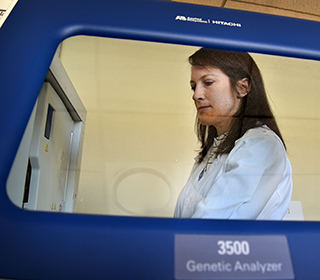Latest News Archive
Please select Category, Year, and then Month to display items
23 November 2022
|
Story André Damons
![]()
Prof Motlalepula Matsabisa, Professor and Director of Pharmacology, will play host to the various stakeholders to network and share knowledge on current developments in indigenous knowledge research and product development, biodiversity, innovation, and commercialisation of the IK-based research products. The Indigenous Knowledge System (IKS) for Health unit in the Department of Pharmacology within the UFS Faculty of Health Sciences was last year awarded an annual Technology Innovation Agency Platform (TIA) grant of R17 million for the next five years.
The research and teaching programme in the School of Clinical Medicine has since been rebranded and is now known as the African Medicines Innovation and Technology Development Platform (AMITD), which will strive to respond to community health needs and address industry research needs and challenges.
The indaba will showcase progress made by TIA and other entities in enriching the development and commercialisation of IK-based innovations. It will take place from 24 to 25 November 2022 in the Equitas Senate Hall at the UFS.
Prof Matsabisa is the chairperson of the World Health Organisation’s (WHO) Regional Expert Advisory Committee on Traditional Medicines for COVID-19. He is also a visiting professor at the Beijing University of Chinese Medicine (BUCM) in Beijing, China, and the Deputy President of the South African Society for Basic and Clinical Pharmacology.

New Division of Virology to deliver crucial services for HIV diagnosis and resistance testing
2015-12-14

The establishment of a Division of Virology within the Department of Medical Microbiology, under the joint auspices of the UFS and the National Health Laboratory Service (NHLS), reflects the continued growth within Virology. Dr Dominique Goedhals, Head of the Division, says the division will also provide training of undergraduate medical students, medical technologists and technicians, and registrars. |
The newly established Division of Virology at the University of the Free State will be one of only five laboratories in the country to be involved in crucial diagnostic and testing services for HIV viral load monitoring, early infant diagnosis, and HIV resistance testing.
The Virology Diagnostic Laboratory serves as the reference laboratory for all HIV National Priority Programme samples for the Free State and Northern Cape provinces.
Medical staff at the laboratory will provide a 24-hour consultative service, as well as outreach programmes to district laboratories in the Free State and Northern Cape where pathologists are not available.
Dr Dominique Goedhals, Head of the Division of Virology, says this division, under the joint auspices of the UFS and the National Health Laboratory Service (NHLS), reflects the continued growth within Virology.
The division will not only deliver this critical diagnostic service, but will also focus on training and teaching, as well as research.
Teaching and training activities include teaching of undergraduate medical students, medical technologists and technicians, and registrars. The postgraduate science programme has a high output of honours, master’s and doctoral students in Virology. The intern medical scientist programme is also active, with five interns having successfully submitted their portfolios since the programme was implemented in 2010.
Research activities under the Head of Research, Prof Felicity Burt, have also expanded and continue to show increases in publication output and acquisition of grant funding. Established research groups within the Division of Virology focus on vector-borne and zoonotic viruses, human papilloma viruses (HPV), and human immunodeficiency virus (HIV), as well as work with a number of international collaborators.